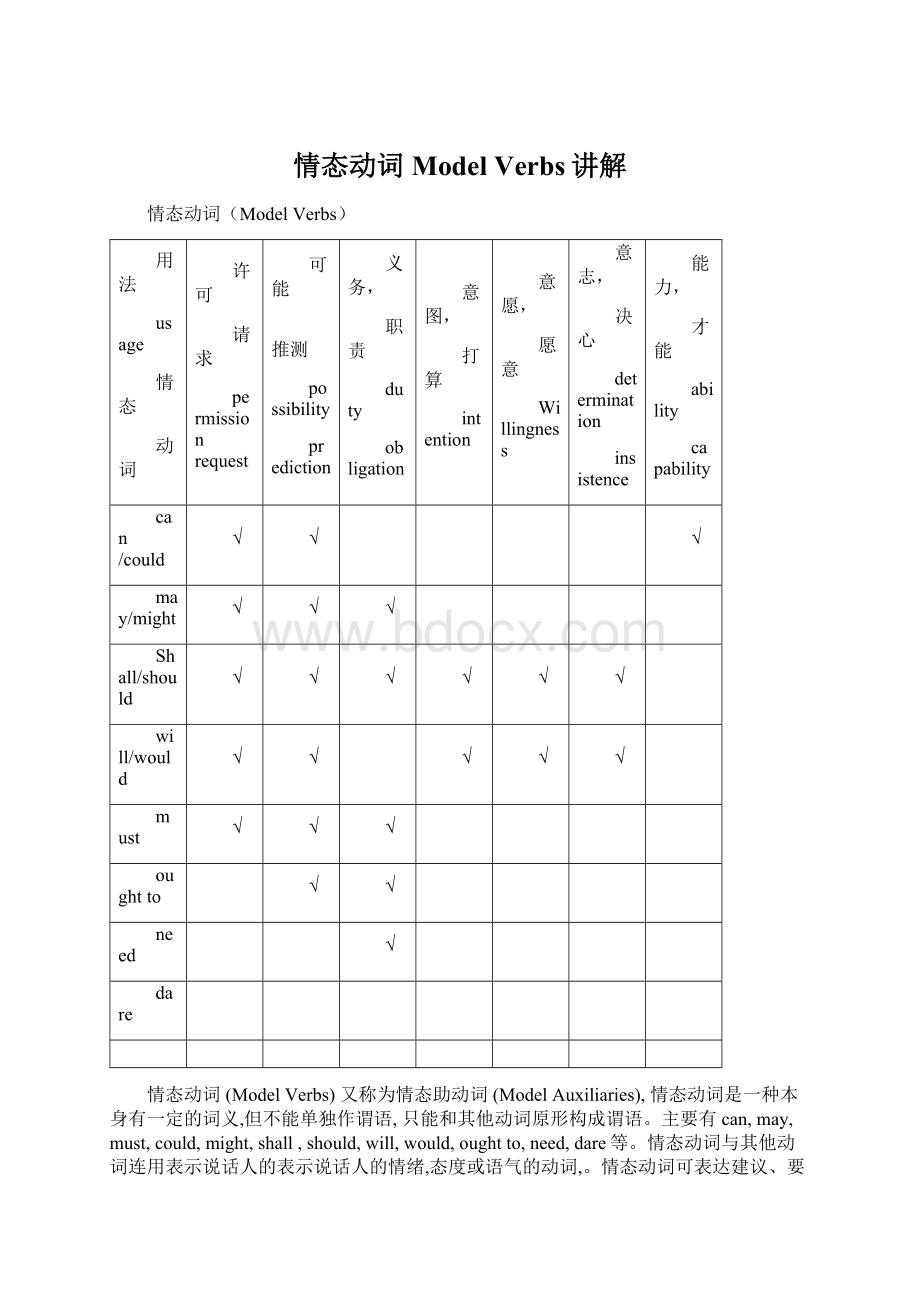情态动词Model Verbs讲解.docx
《情态动词Model Verbs讲解.docx》由会员分享,可在线阅读,更多相关《情态动词Model Verbs讲解.docx(17页珍藏版)》请在冰豆网上搜索。

情态动词ModelVerbs讲解
情态动词(ModelVerbs)
用法
usage
情态
动词
许可
请求
permissionrequest
可能
推测
possibility
prediction
义务,
职责
duty
obligation
意图,
打算
intention
意愿,
愿意
Willingness
意志,
决心
determination
insistence
能力,
才能
ability
capability
can/could
√
√
√
may/might
√
√
√
Shall/should
√
√
√
√
√
√
will/would
√
√
√
√
√
must
√
√
√
oughtto
√
√
need
√
dare
情态动词(ModelVerbs)又称为情态助动词(ModelAuxiliaries),情态动词是一种本身有一定的词义,但不能单独作谓语,只能和其他动词原形构成谓语。
主要有can,may,must,could,might,shall,should,will,would,oughtto,need,dare等。
情态动词与其他动词连用表示说话人的表示说话人的情绪,态度或语气的动词,。
情态动词可表达建议、要求、可能和意愿等。
情态动词没有人称和数的变化。
情态动词意义分类
注意:
与情态动词连用的其他动词是原形,不可带to
情态动词没有人称和数的变化,使用于所有人称
一.can和could的用法:
1.表示:
能力abilityandcapacity意“能够”表示人或动物的内在能力即有某种知识或者技
能而能够做某事。
有时可以和beableto互换。
Hecanswimacrosstheriver(Heisabletoswimacrosstheriver)
CanshespeakEnglish?
(Issheableto----)
Hehurthisfootandcouldn't(wasn'tableto)playfootball.他脚受了伤,所以他不能踢足球了。
can和beableto的区别:
(1)表示能够时,can只能用在现在时(can)和(could)过去时。
而beableto可用于各种时态
Thebabywillbeabletowalknextmonth将来时,不能用
Ihopetobeabletoseeheragain不定式,不用
(2)beableto暗指做成了某一事情。
(manageto)
Becauseheworkedhard,hewasabletopasshisexamination.因为他努力工作,所以他能及格。
(3)can可以表示人的能力或物的能力,而beableto只能表示人的或生物的能力,不表示物的能力。
Theboatisabletocarryfivepeople(错)
Theboatcancarryfivepeople(正)
2.表示推测,预测,可能(possibilityandprediction)表示逻辑上或理论上的可能性,而不是某种实际上将要发生或正在发生的可能性;也是泛指的,一般的可能。
意为“也许,可能”。
相当于:
perhaps,itispossiblethat等;在这种情况下,意为:
“不可能”
Anybodycanmakemistake.任何人都可能犯错误。
Theweatherherecouldbeverycoldinwinter.冬天这的天气有时很冷。
Theholecanbeverydeep
Evenawisemancansometimesmakemistakes
can/could表示推测,预测,可能与may/might的区别:
1.can/could表示逻辑上或理论上的可能性,而不是某种实际上将要发生或正在发生的可能性;may/might表示事实上的可能,某事可能要发生或某时可能正在发生。
2.can/could是泛指的,一般的可能。
can’t意为:
“不可能”
may/might是特指的,具体的可能。
maynot意为:
“可能不,也许不”
Whatshesaidcan’tbetrue?
Whatshesaidmaynotbetrue?
Hecan’tbeonlythirty
Hemaynotbeonlythirty
Itmayraintomorrow.明天可能下雨。
(I'mtoldbytheradio.)
3.表示:
许可,请求(permissionandrequest)
表示说话人的许可或请求别人的许可。
意为“可以”相当于may,但may多用于正式,庄重的场合。
CanIgowithyou?
我能跟你一起去吗?
Youcangonowifyoulike
要注意,在请求允许的用法中,could并不是过去时,它指的都是将来时。
用could要比用can更加迟疑不决,当你没有把握得到允许时,这样更婉转。
CouldIaskyousomething?
我可以问你一件事吗?
Couldyougivemeahand?
你可以帮我一下吗?
用于肯定句和否定句,也可以用于疑问句。
一般用于第一,二人称。
cannot表示“禁止”。
Youcannotsmokeinthebus.公共汽车上不许吸烟。
CanIcarryyourbag?
我来替你提包好吗?
CouldIgiveyoudinneroneofthesedays?
这几天我请你吃顿饭行吗?
Can'tyoudoittomorrow?
你不能明天做吗?
肯定回答,一般是yes,please.thanks。
否定回答,不能用could
CouldIuseyourphone?
Yes,ofcourseyoucan.“我可以用你一下电话吗?
”“当然可以。
”
注意:
一般不用过去一次性允许DuringthemeetingIcouldaskquestions.(误)
4.can/could+havedone
(1)can/couldhavedone用在否定句中表对过去的事情的推测。
Hecan’t/couldn’thavemissedtheway.Idrewhimamap.
(2)couldhavedone在肯定句型中,往往用作委婉的批评.本应该做什么而没做;有时也用作猜测.意为“本来应该,本来能够”
Youcouldhavetoldusearlier.(含有你没有早告诉我)
Tomcouldhavetakenthedictionary.
二.May和might的用法
1.表示:
许可,请求(permissionandrequest)
表示许可,意为:
“可以”即同意别人提出的请求或建议,或请求别人许可,相当于allow或permit。
同can相比may和might用于比较正式文体,往往含有尊敬之意。
might表示比较迟疑,婉转。
不很常用。
Youmayleavenow.(=Iallowyoutoleave/Youarepermittedtoleave)
Youmaysmoke.你可以吸烟。
Visitorsmayascendthetower.参观者可以登塔。
Youmightpostthisletterforme.是否请你给我寄一下封信。
MayImakeasuggestion?
我可以提个建议?
MightIborrowyourbike?
我借用你的自行车可以吗?
1)一般用于肯定,疑问和否定句。
否定用于拒绝给予许可,或禁止做某事。
通常在官方公告中,否定情态动词
Studentsmaynotstayoutaftermidnight.学生午夜后不得在外逗留。
2)用于问句和条件句表示请求。
IfImaysayso,youarenotright.你是不对的,如果我可以这么说的话。
MayIgonow?
No,youmay.我现在可以走了吗?
是的,你可以走了。
3)否定回答,一般用mustn't或cannot,也可以maynot。
Mustn’t语气较硬,有命令强制的意味
MayIcomein?
我可以进去吗?
No,youmustn't.不,你不许进。
肯定回答,一般是sure,certainly,ofcourse,不能用might
MightItroubleyouforalight?
“Youmayindeed.”“我可以向你借火吗?
”“当然可以”
要注意,在请求允许的用法中,might并不是过去时,它指的都是将来时。
2.表示:
可能,预测(possibilityandprediction)
表示事实上的可能,某事可能要发生或某时可能正在发生。
Itmayraintomorrow.明天可能下雨。
(I'mtoldbytheradio.)。
Whatyousaidmightbetrue.你说的可能对。
Helookspale.Hemaybeill.他脸色苍白,可能有病。
一般用于肯定和否定陈述句,而疑问句中常用can,用于否定时否定动词。
Hemaynotbeathome.他可能不在家。
Thenewsmay,ormaynot,betrue.这个消息可能是,也可能不是真实的。
might可能是逻辑上或事实上的可能may小一些。
它表示的可能性比might语气弱,可用于疑问句,Might可用于条件句。
Ifyoutooksomeexercise,youmightnotbesofat.要是你锻炼锻炼,可能不会这样胖。
重读“may”表示可能。
He'maynotgotomorrow.重读“not"表示“允许”。
Hemay'notgotomorrow
3.表示:
必须,义务(dutyandobligation )
may用于法律和条约,相当于shall。
用的较少。
Paymentmaybepaidbycheck.应用支票付款。
might用来对人们提出建议,该干什么或应该干什么。
也可以用来提出批评。
Youmightaskbeforeyouborrowmycar.你应该先问问我在借我的车子。
Heisinpoorhealth.Hecanbeillatanytime.他体质很差,任何时候都有可能生病。
4.Maywell和mayaswell结构
“maywell+动词原形”是一种常用结构,意为“完全能,很可能”相当于tobeverylikelyto
Hemaywellbeproudofhisson他大为儿子高兴
Herappearancehaschangedsomuchthatyoumaywellnotrecognizeher
她的摸样变化太大,我很可能认不出他了
“Mayaswell+动词原形”意为:
“最好,满以为,到不如”相当于hadbetter或
tohavenostrongreasonnotto
Youmayaswellstayhereoverthenight你最好留在这里过夜
Youmayaswelldoitatonce
5.maybe和maybe的区别:
maybe是“情态动词+系动词”结构,表示“可能有,可能在”,否定式为maynotbe。
maybe是副词,意为“大概,也许,可能”在句中做状语。
Hemaybeoverthirtyyearsold
Maybeheisoverthirtyyearsold
6.may/might+havedone
may/mighthavedone表示推测过去某事“也许”发生了.may比might表示的可能性在说话人看来稍大些。
例如:
Ican’tfindmykeys.Imay/mighthaveleftthemattheschoolyesterday.
Iamafraidshemayhavefallenill
Youmayhavenoticedsomethingmovinginthedistance
ShemighthavestudiedEnglishforyears
Youdidn’ttakethebusoryoumighthavekilled
7.may祈使句中表示祝愿,
Mayweneverforgeteachother
Mayyoureturninsafety
Mayyoubehappy
三.Shall和should的用法
1.shall表示:
许可,请求.表示征求对方意见,请求给予指导。
一般用于第一,三人称疑问句。
Shallwetakeumbrellawithus?
我们带雨伞好吗?
ShallIopenthewindow?
我可以开窗户吗?
Shallhecometoseeyou?
要不要他来看你?
ShallIbuythebookforyou?
Shallshedothework?
你要她做那项工作吗?
肯定回答,一般是ofcourse;certainly;yes,please。
否定回答,一般是no,thanks。
Should表示的语气更谦虚,婉转,主要是提出建议,意见或请求,意为“到想,想”
Ishouldsayitwouldbebettertodelaythemeeting
Ishouldadviseyoutosaylessanddomore
Ishouldthinkso
2.shall用于第二人称,表示命令,禁止,威胁等。
Allofyoushallarrivebeforefiveo’clock你们都必须在5点之前到(命令)
Youshallnotspitonthefloor.你不可往地上吐痰(禁止)
Ifyoudaredothat,youshallbepunished如果你敢做那件事,将受到处罚
3.shall用于所有人称,表示规章,法令,预言。
Shall在条约,规章和法令等文件中,表示义务和规定。
Eachplayershallwearanumber.每个运动员必须带上号。
Freedomofspeechshallnotbeviolated
Theserulesshallbeobeyed
Allshalldie
should表示主语的职责和义务或说话人的劝告。
强调主观上。
不象must那么独断专横。
意为“应该”
should+动词原形(现在或将来应该做的事)
should+动词完成时(过去应该做而没有做的事.含责备的意味)
should+动词完成式(过去应该做而没有做的事.含责备的意味)
Youshouldn'tjudgeamanalwaysbytheclothes.你不应该总是以貌取人。
Youshouldbemorepatient
Youshoulddoitbetternexttime
Heshouldhavecomeearlier.(buthehasn’t-------
Youshouldn’thavelenthimmoneyinthepast
4.Shall/should表示推测,预测,可能(possibilityandprediction)表示说话人的猜测,估计多用于第一人称。
Ishallberichoneday.总有天我会发财的。
ThatshouldbeJanetcomingupstairsnow.正在上楼的准是珍妮特。
Heshouldbearound60yearsold
Sheshouldbeasingeroradancer
Heshouldhavefinishedreadingthebookbynow
5.表示说话人的意志和决心。
shall要重读。
只用于第二,三人称肯定句。
You'shallmarryhim.我坚持你应和他结婚。
Noone'shallstopme.不许任何人阻止我。
You'shallobeyorders.我要你服从命令。
Theenemyshallnotpass.决不让敌人过去。
Heshallgethismoney.愿意他拿到他的钱。
6.表示说话人的意愿一般用于肯定句,用于第二,三人称。
在疑问句中,表示征询听话人是否愿意。
Youshouldstayhereaslongasyoulike.只要你乐意,愿意你呆在这。
shallyoudosomeshoppingwithme?
你愿意和我一起买东西去吗?
7.用于说话人的意图。
同will可以互换。
Weshan't/won'tgoifitrains.如果下雨,我们不打算走了。
只能用于第一人称,
Ishan'tstayherelong.我不打算在这呆很长时间。
四.Will和would的用法
1./Will/would表示主观的意愿,意志,可用于第一,二,三人称
肯定句用于各种人称,用于二,三人称疑问句表示询问别人是否愿意做谋事,
可用于条件句中。
肯定回答,一般ofcourse.。
Hewillhelpyouifyouaskhim.如果你问他,他会帮助你的
Shewillgivehimanythinghewants
Theywillgotheirwaynomatterwhathappens
He'willdoitwheneveryousay.你什么时候说,他一定会做的。
Wouldyouexcuseme?
(婉转)你能原谅我吗?
Iwillhavemyownway.我要走自己的路。
Hewon'tdowhathe'stold.他不会做别人让他干的事。
Willyoucomethisway,please.你这边走不行吗?
Ifyouwillgo,youmaygoatonce.如果你非走不可,你可以马上走。
Would/Willyouhaveanothercupoftea?
你想再来一杯茶吗?
Hesaidshewouldtakecareofthechild
ThemanwouldnotletherenterthehallI'willstopsmoking.我决心戒烟了。
(意志)
2.表示请求。
恭敬的请求或征求意见,would更客气。
一般用于第二人称。
肯定回答,一般是sure,certainly。
Will/Wouldyoupassmethesalt,please?
请把盐递过来,好吗?
Will/Wouldyouspellyourname?
请你拼一下你的名字好吗?
Wouldyoutellmethewaytotheairport?
Wouldyoumindmysittinghere?
3.表示推测,意为“大概,也许”,will可指现在或将来;对现在的预测认为肯定会发生。
would可指现在和过去
Ithinkhewillbeallrightnow.我想他现在一定好了。
Thatwouldbehismother.那肯定是他母亲。
ThatwillbeTom’scap
Thiswillbethepenyouhavelost
4.用于表示“意图”,主要用于第一人称,will不重读,可用缩写的形式。
用于条件句,用于各种人称
I'llwriteassoonasIcan.我会尽快写信。
Whowillgowithme?
谁愿意和我去?
Wewon'tstaytheretoolong.我们不愿在那多呆的太久
Willyouaccepthisoffer?
你愿意接受他的报价吗?
5.Will有时表示某种倾向和习惯性。
Would有时表示过去的习惯,过去常常,后接动词原形,意为:
“总是,总会”
Oilwillfloatonwater.油浮在水面上。
He'lltalkforhoursifyougivethechance.如果给他机会,他会谈上几个小时。
Onthemagneticequatortheneedlewouldremainhorizontal.在磁赤道上磁针会保持水平。
Thedoorwillnotopen
Hewillwriteforhoursatatime
Hewouldgetupveryearly.过去他常常起的很早。
Hewouldsitnearthefireforhoursonwinterevenings
WhenIwasachild,Iwouldgoswimmingwithotherchildreninsummer
6.wouldrather表示“宁愿”结构为wouldratherdosth.
wouldlike+that+宾语从句,要虚拟,结构为: